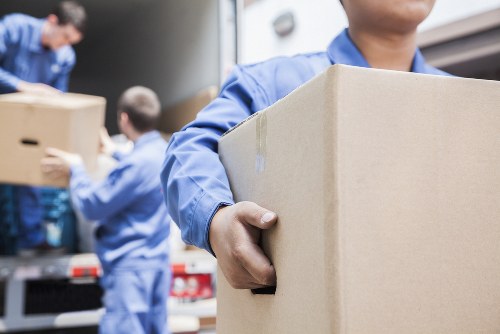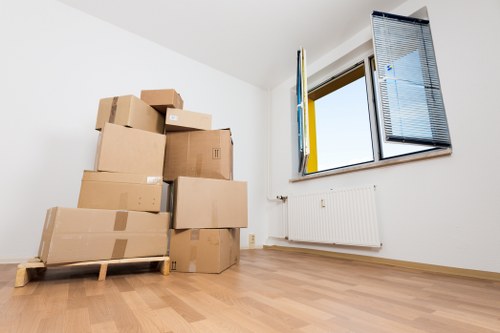Comprehensive Guide to Council Waste Collection in Epping

Managing waste efficiently is crucial for maintaining the cleanliness and sustainability of any community. In Epping, the Council Waste Collection services play a pivotal role in ensuring that residents can dispose of their waste responsibly and conveniently.
Understanding how the waste collection system works in Epping can help residents minimize their environmental footprint and keep their neighborhoods pristine. This article delves into the various aspects of Council Waste Collection in Epping, offering detailed insights and practical tips for effective waste management.
From regular garbage pickup schedules to recycling programs and special waste disposal services, Epping’s council has established a comprehensive framework to cater to the diverse needs of its residents.
Overview of Epping's Waste Collection Services

Epping Council offers a range of waste collection services designed to handle different types of waste, ensuring that each category is managed appropriately. The main services include general waste collection, recycling services, and special waste disposal.
General Waste Collection covers everyday trash that residents generate, such as food scraps, packaging, and other non-recyclable materials. This service is typically scheduled on a weekly basis, providing residents with regular pickup to maintain cleanliness.
Recycling Services encourage residents to separate recyclable materials like paper, glass, and plastics. By doing so, Epping minimizes the amount of waste sent to landfills and promotes the reuse of valuable resources.
Special Waste Disposal

In addition to regular waste, Epping Council provides facilities for disposing of special waste items such as electronics, batteries, chemicals, and bulky items. These items require careful handling to prevent environmental contamination and ensure safe disposal.
Residents can access these services by scheduling pickups or dropping off items at designated collection points throughout the region.
The council also organizes periodic collection events for hazardous and bulky waste, making it easier for residents to dispose of these items responsibly.
How to Prepare Your Waste for Collection

Properly preparing your waste for collection is essential to ensure efficient pickup and reduce the risk of contamination. Here are some key steps to follow:
- Separate Recyclables: Sort recyclable materials into designated bins for paper, glass, and plastics.
- Compact Your Waste: Break down cardboard boxes and crush bottles and cans to save space.
- Secure Your Bins: Ensure that all waste bins are securely closed to prevent litter and pests.
- Handle Special Waste: Follow specific guidelines for disposing of hazardous and bulky items by using the council’s special waste services.
By following these steps, residents can help maintain an organized and efficient waste collection system, contributing to a cleaner and healthier community.
Recycling Guidelines

Recycling is a fundamental component of Epping's waste management strategy. Adhering to the council’s recycling guidelines ensures that recyclable materials are processed correctly, reducing environmental impact and promoting sustainability.
Key Recycling Tips:
- Clean Your Recyclables: Rinse containers to remove food residue, which can contaminate recycling streams.
- Sort Properly: Place recyclables in the correct bins as per council guidelines to avoid rejection at processing facilities.
- Avoid Non-Recyclables: Do not include items like plastic bags, Styrofoam, or certain types of packaging that are not accepted.
By properly sorting and cleaning recyclables, residents contribute to the efficiency and effectiveness of the recycling program, ensuring that materials are reused and conserved.
Schedule and Collection Areas

Epping Council provides a structured waste collection schedule to accommodate the needs of all residents. Waste collection typically occurs on specific days of the week, with designated areas assigned to different pickup times.
Residents can easily find their collection day by referring to the council’s online tool or contacting the local waste management office. Adhering to the schedule ensures timely pickups and prevents missed collections.
The council also offers flexible options for special waste pickups, allowing residents to schedule extra services when needed.
Special Collection Services

For items that require special handling, such as large furniture, electronic waste, or hazardous materials, Epping Council provides specialized collection services. These services are designed to ensure that such items are disposed of safely and in compliance with environmental regulations.
- Electronic Waste: Safe disposal of old electronics to prevent harmful substances from entering the environment.
- Bulky Items: Collection of large items like sofas, mattresses, and appliances that cannot be handled during regular pickups.
- Hazardous Materials: Proper disposal of chemicals, batteries, and other hazardous substances to protect public health and the environment.
Residents can arrange for special pickups by contacting the council’s waste management team, ensuring that these items are handled responsibly.
Benefits of Using Council Waste Collection

Utilizing the Council Waste Collection services in Epping offers numerous benefits for both residents and the community at large. Some of the key advantages include:
- Environmental Protection: Proper waste management reduces pollution and conserves natural resources.
- Community Cleanliness: Regular waste pickups help maintain clean and attractive neighborhoods.
- Health and Safety: Safe disposal of hazardous waste prevents health hazards and environmental contamination.
- Cost-Effective: Utilizing council services can be more affordable compared to private waste disposal options.
These benefits highlight the importance of adhering to council waste collection guidelines and actively participating in sustainable waste management practices.
Environmental Impact

Effective waste collection and management have a significant positive impact on the environment. By reducing the amount of waste sent to landfills, recycling materials, and properly disposing of hazardous substances, Epping Council helps to minimize pollution and conserve natural resources.
Moreover, promoting recycling and waste reduction initiatives encourages residents to adopt more sustainable lifestyles, fostering a culture of environmental responsibility within the community.
These collective efforts contribute to a healthier environment and a more sustainable future for Epping.
Local Regulations and Compliance

Epping Council enforces strict regulations to ensure that waste is managed responsibly and sustainably. Residents are expected to comply with local waste disposal rules to maintain the effectiveness of the waste collection system.
Key regulations include:
- Proper Sorting: Adhering to recycling guidelines to ensure materials are processed correctly.
- Bin Placement: Placing waste bins at the designated collection points on scheduled days.
- Prohibited Items: Avoiding the disposal of banned items such as certain chemicals, tires, and medical waste through regular collection services.
Non-compliance with these regulations can result in fines or penalties, emphasizing the importance of understanding and following council waste management policies.
Penalties for Non-Compliance

To ensure adherence to waste management policies, Epping Council enforces penalties for non-compliance. Common violations include improper waste sorting, missed collections, and illegal dumping of prohibited items.
Penalties may include fines, increased waste collection fees, or mandatory cleanup efforts. These measures are in place to encourage responsible waste disposal and maintain the integrity of the community’s waste management system.
Residents are encouraged to familiarize themselves with council regulations to avoid any unintended violations and contribute positively to the community.
Recycling and Sustainability Initiatives

Epping Council is committed to promoting recycling and sustainability within the community. Various initiatives are in place to encourage residents to reduce waste, recycle more, and adopt environmentally friendly practices.
Some of these initiatives include:
- Recycling Education: Providing resources and information to help residents understand the importance of recycling and how to do it effectively.
- Composting Programs: Encouraging the use of compost bins for organic waste to reduce landfill burden and produce useful compost for gardening.
- Waste Reduction Campaigns: Promoting practices that minimize waste generation, such as using reusable bags and containers.
These efforts not only help in managing waste more efficiently but also foster a culture of environmental stewardship among residents.
Composting in Epping

Composting is a sustainable practice encouraged by Epping Council to handle organic waste. By turning kitchen scraps and garden waste into nutrient-rich compost, residents can reduce the volume of waste sent to landfills and create valuable soil amendments for their gardens.
The council provides guidelines and resources for effective composting, including information on proper bin usage, types of materials suitable for composting, and maintenance tips to ensure successful compost production.
Participating in composting programs not only benefits the environment but also enhances gardening efforts, creating a win-win situation for residents and the community.
Special Waste Collection Events

In addition to regular waste collection services, Epping Council organizes special waste collection events to handle items that require special disposal methods. These events are typically scheduled periodically and provide residents with the opportunity to dispose of bulk items, hazardous materials, and electronic waste safely.
Special waste collection events are essential for managing waste that cannot be handled through regular pickups, ensuring that such items are disposed of responsibly and without causing environmental harm.
Residents are encouraged to take advantage of these events by preparing their special waste items in advance and following the council’s guidelines for disposal.
Electronic Waste Drive

Electronic waste, or e-waste, includes items like old computers, televisions, and mobile phones. These items contain hazardous materials that can be harmful to the environment if not disposed of properly.
Epping Council hosts electronic waste collection drives to ensure that residents can dispose of their e-waste safely. These drives are typically held several times a year at designated locations, providing convenient access for all residents.
By participating in e-waste drives, residents help prevent toxic substances from entering the environment and promote the recycling and reuse of valuable electronic components.
Tips for Reducing Household Waste

Reducing household waste is a key aspect of sustainable living. Here are some practical tips that residents of Epping can implement to minimize their waste production:
- Buy Only What You Need: Plan your purchases to avoid excess and reduce food and product waste.
- Use Reusable Containers: Opt for reusable bags, bottles, and containers instead of single-use plastics.
- Repair and Reuse: Fix broken items instead of discarding them, and find new uses for old products.
- Compost Organic Waste: Turn kitchen scraps and garden waste into compost to reduce landfill waste.
Implementing these strategies can significantly decrease the amount of waste generated by households, contributing to a cleaner and more sustainable community.
Mindful Consumption

Mindful consumption involves making conscious choices about what you buy and how you use products. By being more aware of your consumption patterns, you can reduce unnecessary waste and make more sustainable choices.
Consider the lifecycle of products, from production to disposal, and opt for items that are durable, recyclable, or have minimal environmental impact. Supporting local and sustainable businesses can also help reduce your overall carbon footprint.
Mindful consumption not only benefits the environment but also promotes a more intentional and fulfilling lifestyle.
Role of the Community in Waste Management

The community plays a vital role in the success of Epping's waste management system. Active participation and cooperation from residents are essential for maintaining an effective and efficient waste collection process.
Community involvement includes adhering to waste sorting guidelines, participating in recycling programs, and taking advantage of special waste collection services. Additionally, residents can engage in local initiatives, such as neighborhood cleanups and sustainability workshops, to further support waste reduction efforts.
By working together, the community can achieve significant improvements in waste management, leading to a cleaner and healthier environment for everyone.
Community Clean-Up Events

Community clean-up events are organized by the council and local organizations to promote environmental stewardship and keep neighborhoods free of litter and debris. These events bring together residents to collectively clean public spaces, parks, and streets.
Participation in clean-up events fosters a sense of community and shared responsibility for maintaining a clean and safe environment. It also provides an opportunity for residents to connect with each other and contribute positively to their locality.
Joining these events can make a tangible difference in the appearance and health of the community, reinforcing the importance of collective action in waste management.
Innovations in Waste Collection

Epping Council is continually exploring innovative solutions to enhance waste collection and management. Embracing new technologies and practices helps improve efficiency, reduce costs, and minimize environmental impact.
Some of the recent innovations include:
- Smart Waste Bins: Equipped with sensors to monitor fill levels, enabling optimized collection routes and schedules.
- Automated Sorting Facilities: Utilizing advanced machinery and AI to sort waste more accurately and efficiently.
- Bioenergy Recovery: Converting organic waste into renewable energy sources, reducing reliance on fossil fuels.
These advancements demonstrate the council’s commitment to progressive waste management practices, ensuring a sustainable future for Epping.
Smart Waste Management Systems

Smart waste management systems leverage technology to improve the efficiency of waste collection and processing. By using data analytics and real-time monitoring, Epping Council can make informed decisions about collection routes, schedules, and resource allocation.
These systems help reduce fuel consumption, lower operational costs, and minimize the environmental impact of waste collection vehicles. Additionally, residents benefit from more reliable and timely waste pickup services.
The adoption of smart technologies underscores the council’s dedication to modernizing waste management and enhancing service delivery for the community.
Conclusion

Effective waste management is a collective responsibility that requires the active participation of all community members. Epping Council’s Waste Collection services provide a robust framework for handling various types of waste, promoting recycling, and supporting sustainability initiatives.
By understanding and following the council’s guidelines, residents can contribute to a cleaner, healthier, and more sustainable Epping. Embracing responsible waste disposal practices not only benefits the environment but also enhances the quality of life for everyone in the community.
Stay informed, stay compliant, and take proactive steps to manage your waste effectively. Together, we can make a positive impact on our environment and ensure a better future for generations to come.
Frequently Asked Questions

1. What items are considered special waste in Epping?
Special waste includes electronic items like computers and TVs, batteries, chemicals, and bulky items such as furniture and appliances. These require careful handling and should be disposed of through the council’s special waste collection services.
2. How can I find out my waste collection day in Epping?
You can find your waste collection day by using the Epping Council’s online tool, referring to your waste collection schedule notice, or contacting the local waste management office for assistance.
3. Are there any fees for special waste collections?
Depending on the type and volume of special waste, there may be fees associated with its collection and disposal. It is recommended to contact Epping Council for specific information on costs related to special waste services.
4. How can I reduce my household waste?
To reduce household waste, you can buy only what you need, use reusable containers, repair and reuse items instead of discarding them, and compost organic waste. Additionally, adhering to recycling guidelines helps minimize the overall waste generated.
5. What happens if I don’t comply with Epping’s waste disposal regulations?
Non-compliance with waste disposal regulations can result in fines, increased waste collection fees, or mandatory cleanup efforts. It’s important to follow council guidelines to avoid penalties and contribute positively to the community’s waste management system.